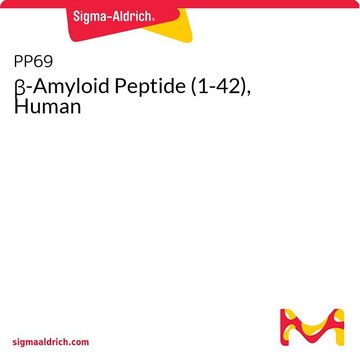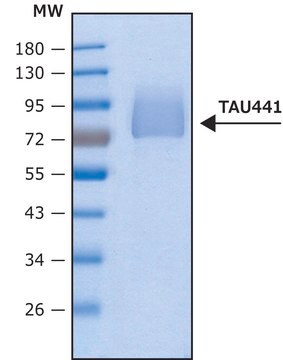AG916
β Amyloid 1-42, aβ, scrambled, TFA, recombinant E. coli
Iniciar sesiónpara Ver la Fijación de precios por contrato y de la organización
About This Item
Código UNSPSC:
12352202
eCl@ss:
32160405
NACRES:
NA.41
Productos recomendados
origen biológico
Escherichia coli
Nivel de calidad
Análisis
>97%
formulario
powder
fabricante / nombre comercial
Chemicon®
Nº de acceso NCBI
Nº de acceso UniProt
Información sobre el gen
human ... APP(351)
Descripción general
MOL. WT.: (theoretical 4514.1)
SEQUENCE: Lys-Val-Lys-Gly-Leu-Ile-Asp-Gly-Ala-His-Ile-Gly-Asp-Leu-Val-Tyr-Glu-Phe-Met-Asp-Ser-Asn-Ser-Ala-Ile-Phe-Arg-Glu-Gly-Val-Gly-Ala-Gly-His-Val-His-Val-Ala-Gln-Val-Glu-Phe
PEPTIDE CONTENT: 500 µg per vial
COUNTER ION: TFA
SEQUENCE: Lys-Val-Lys-Gly-Leu-Ile-Asp-Gly-Ala-His-Ile-Gly-Asp-Leu-Val-Tyr-Glu-Phe-Met-Asp-Ser-Asn-Ser-Ala-Ile-Phe-Arg-Glu-Gly-Val-Gly-Ala-Gly-His-Val-His-Val-Ala-Gln-Val-Glu-Phe
PEPTIDE CONTENT: 500 µg per vial
COUNTER ION: TFA
Aplicación
Different researchers claim enhanced activity due to different salts.
The TFA salt is what has been the industry standard.
The HFIP makes the beta-amyloid homogenously monomeric.
The NaOH apparently make it monomeric too and is also water soluble, which the TFA salt and HFIP are not.
The HCl salt is supposed to be more biological, as TFA is not found in the body.
By offering the different salts, it lets the researchers duplicate the different assays that have been developed by other researchers (see below).
TFA: Shu-chuan Jao, S-C, et. al. 1997, Amyloid; Int J Exp. Clinical Invest. 4, 231
HFIP: Stine, W.B. et. al. 2003, J. Biol. Chem, 278, 11612
NaOH: Fezoui, Y., et. al. 2000, Amyloid, 7, 166
HCL: Kanek, I and Tutumi, S., 1997, J. Neurochem, 68, 438
The TFA salt is what has been the industry standard.
The HFIP makes the beta-amyloid homogenously monomeric.
The NaOH apparently make it monomeric too and is also water soluble, which the TFA salt and HFIP are not.
The HCl salt is supposed to be more biological, as TFA is not found in the body.
By offering the different salts, it lets the researchers duplicate the different assays that have been developed by other researchers (see below).
TFA: Shu-chuan Jao, S-C, et. al. 1997, Amyloid; Int J Exp. Clinical Invest. 4, 231
HFIP: Stine, W.B. et. al. 2003, J. Biol. Chem, 278, 11612
NaOH: Fezoui, Y., et. al. 2000, Amyloid, 7, 166
HCL: Kanek, I and Tutumi, S., 1997, J. Neurochem, 68, 438
Research Category
Neuroscience
Neuroscience
Research Sub Category
Neurodegenerative Diseases
Neurodegenerative Diseases
Envase
Salt content is <15%
Forma física
White lyophilized powder. Resuspend in 1.0% NH4OH at a concentration of 1 mg/mL. Sonicate for 30 seconds to 1 minute after it has gone into solution. To bring into your solution: After resuspension, add 5x or 10x buffer stock (PBS, TBS) and water to bring to 1x buffer.
Almacenamiento y estabilidad
Maintain lyophilized material at -20ºC for up to 12 months after date of receipt. After reconstitution maintain at -20ºC to -70ºC for up to 2 weeks in undiluted aliquots. Avoid freeze/thaw cycles to avoid aggregation.
Información legal
CHEMICON is a registered trademark of Merck KGaA, Darmstadt, Germany
Cláusula de descargo de responsabilidad
Unless otherwise stated in our catalog or other company documentation accompanying the product(s), our products are intended for research use only and are not to be used for any other purpose, which includes but is not limited to, unauthorized commercial uses, in vitro diagnostic uses, ex vivo or in vivo therapeutic uses or any type of consumption or application to humans or animals.
Código de clase de almacenamiento
11 - Combustible Solids
Clase de riesgo para el agua (WGK)
WGK 1
Punto de inflamabilidad (°F)
Not applicable
Punto de inflamabilidad (°C)
Not applicable
Certificados de análisis (COA)
Busque Certificados de análisis (COA) introduciendo el número de lote del producto. Los números de lote se encuentran en la etiqueta del producto después de las palabras «Lot» o «Batch»
¿Ya tiene este producto?
Encuentre la documentación para los productos que ha comprado recientemente en la Biblioteca de documentos.
Nuestro equipo de científicos tiene experiencia en todas las áreas de investigación: Ciencias de la vida, Ciencia de los materiales, Síntesis química, Cromatografía, Analítica y muchas otras.
Póngase en contacto con el Servicio técnico






